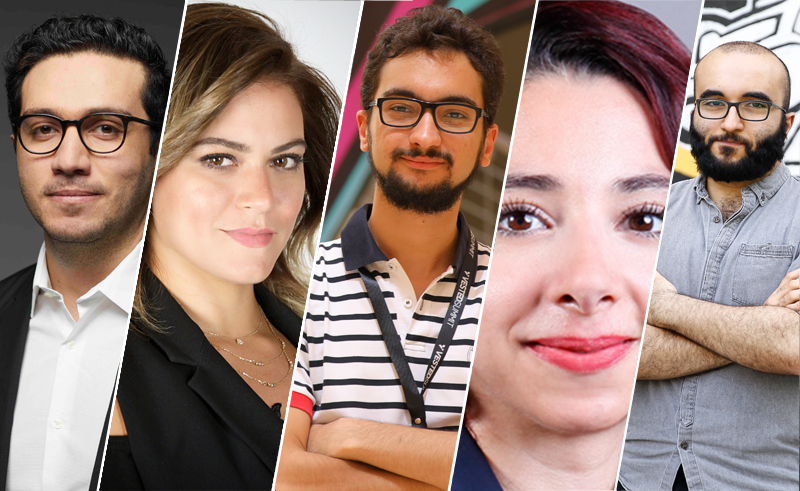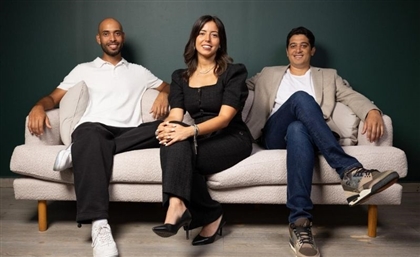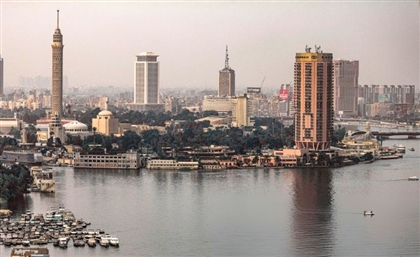5 Middle Eastern Entrepreneurs Working With Blockchain To Reach The Future
We speak with 5 of the region's fiercest entrepreneurs aiming to decentralise not only the banking system, but the entire world wide web.

2020 is only two years away. It is also the year when the Emirati commercial capital is set to turn visa applications, bill payments and license renewals to be transacted digitally on the blockchain.
Middle Eastern governments are among many falling behind in terms of regulating the activities of blockchain developers. Following Dubai's plans to become the first "blockchain city," Abu Dhabi announced its aspiration to become the pioneer government to support blockchain by addressing the full range of risks associated with crypto asset activities, such as risks of money laundering and financial crimes, consumer protection against infamous ICO scams for example, technology governance, custody and exchange operations. In fact, Abu Dhabi Global Market (ADGM), the Emirati capital's international financial centre, launched its framework to regulate spot crypto asset activities on Monday, June 25th, which includes crypto asset activities undertaken by exchanges, custodians and other intermediaries in ADGM.
In Egypt, the Central Bank of Egypt (CBE) released a warning last January against trading or transacting in bitcoins after a startup called Bitcoin Egypt attempted to start a cryptocurrency exchange, a template platform that had already existed in several countries at that time. The CBE stressed that transactions in the country are limited to currencies printed and accredited by the bank, calling on traders in the local market to be very careful and not to deal in these 'high-risk' bitcoins.
From Egypt, to Lebanon to UAE, we speak to a bundle of blockchain entrepreneurs who are investing funds, time, and effort, to pressure authorities to regulate working with the technology. While some have succeeded at doing the latter, others have sought working on blockchain abroad while still impacting the blockchain scene at home.
1. Rami Khalil, founder of Liquidity Network (Egypt)

Having graduated from school in Alexandria, Rami Khalil earned a scholarship from the German University in Cairo where he studied Computer Science and embarked on his journey of self-discovery. He discovered he's a blockchain entrepreneur.
After graduation he flew to the USA to develop his skills with the help of international giants such as Facebook, where he trained from September to December 2017. But his academic journey didn't stop there. Khalil embarked on another journey in Zurich, Switzerland, where he studied Information Security. Bitcoin Egypt was born out of the research he was doing for his master’s degree in information security, which was focused on a topic inside bitcoin called payment channels.
“I had created a publication called 'Revive' that enables a network of payment channels to correct itself in a particular way. From here, I started to develop an interest in bitcoin,” he tells Startup Scene, as he recalls the inception of the company he almost established with his partner, Omar Abdel-Rassoul, a year ago. “We were totally ready to start with the cryptocurrency exchange.”
The Egyptian bank in which Bitcoin Egypt was registered in called Abdel-Rassoul to inform him that they will be closing his company’s account and that he will need to empty out the remaining funds. Abdel Rassoul called Khalil in Switzerland right away. “I was in Zurich at the time, just done with my exams and waiting for a US Visa to go do an internship at Facebook in California,” Khalil says.
Moving on, Khalil succumbed to the fact that blockchain was unwelcome back home. So he launched his startup in Zurich, this time he called it Liquidity Network and reshaped the original business model he had in mind back in Egypt. Liquidity Network runs a protocol in parallel with that of blockchain, also allowing the funds that you’re dealing with inside the network; just like blockchain, no one except you has the authority to move it, but that would remove the transaction costs, the slowness. It basically makes cryptocurrencies commercially viable and spendable. "We are a licensed financial intermediary, even though we aren't required to be licensed," he says.
Blockchain is still not engineered in a way to be used by masses. "If I process things centrally on one device, it will work so much faster than processing the same thing several times on several devices. So I have to balance the security that I want from decentralisation," he says. Enter sharding; a concept that’s widely used in databases. A shard is a horizontal portion of a database, with each shard stored in a separate server instance; spreading the load and in turn making the database more efficient. Sharding is one method to solve blockchain's scalability problem that critics often point out. "I could have an account in a certain blockchain but the devices responsible for the security of this account are mutually exclusive from other devices responsible for different accounts in the same node. So that also scales up the usage," Khalil explains further.
Read more about Khalil's startup here.
2. Nour Haridy, founder of Lamarkaz (Egypt)
 Egyptian Nour Haridy has been drawing eyes, who watch him in disbelief; how can a 20-year-old who hasn't even enrolled in college yet be able to grasp all this knowledge about blockchain?
Egyptian Nour Haridy has been drawing eyes, who watch him in disbelief; how can a 20-year-old who hasn't even enrolled in college yet be able to grasp all this knowledge about blockchain?
"I think academic curriculums always fall behind the latest technologies," he tells Startup Scene. "So, I’d rather stay ahead and at the same time have this academic security and take no risks in terms of career. But, also not have any kind of attachments. I love freedom, really, in everything including education."
Freelancing with Dutch blockchain company Tykn along with running his startup, Lamarkaz, Haridy joined the global army of coders developing the technology that will dismantle not only the banking system, but the entire world order. Founded in September 2017, Lamarkaz works on producing white paper analysing the flaws in blockchain and how to come around them, driven by the mission to help accelerate blockchain worldwide adoption.
One of its first products is Dcourt, a decentralised court where people can have their conflicts resolved without a central resolver. "What we are also trying to do is to be better than central arbitrations, using tangible economic collaterals. So users would know that they are guaranteed to have a fair trial by this sum of money. So we're trying to create more resilient, more reliable conflict systems where we can have actual true justice without having to depend on a centre that tells us their verdict from their own perspective, he breaks it down to Startup Scene.
"People who work in call centres for example, those who resolve people's problems; they have no direct consequences to their decisions. This is what we're changing. Replacing them by random people who also have experience in resolving such problems, but also putting direct consequences on their decisions. So we're distributing the decision-making," he explains.
Read the full interview with Haridy here.
3. Randa Al-Rifai, leader and organiser of Bitcoin and Blockchain Beirut Labs (Lebanon)

Her first encounter with blockchain was four years ago when she started reading and following up with bitcoin news untill she earned her Digital Currency Certificate in 2015. "This gave me the privilege to be the first Lebanese woman to accomplish this certificate as well as the first to organise, lead, and present the first Blockchain and Cryptocurrencies community in Lebanon," Al-Rifai tells Startup Scene.
She elaborates that Lebanon has been evolving in embracing the digital transformation through governmental and private institutions, leading to frequent conferences that take place discussing blockchain technology. "Moreover, there has been an appetite for exploring blockchain and its potentials in Lebanon by business owners, university students, and the central bank," she adds.
Based on the entrepreneur's exposure to previous events organized by the community, she had been witnessing rapid increase of traction to this subject since 2016. "The impact of blockchain is in its infant stage, where citizens are eager to learn before any implementation."
She explains that her country's need for blockchain depends on how flexible and suitable can blockchain be and how possible it can solve problems related to Lebanese ecosystems. "Until today, awareness, education, and experiments are the main targets which will enhance further successful opportunities."
4. Mohamed El-Kasstawi, co-founder of zk Capital (Egypt)

Sabayek Dahab (Arabic for gold bars) were a great investment in the past; the world needed a global store of value that everyone could trust. "However, that trust was harder to maintain due to weight, being able to transfer, and susceptible to political turmoil," he says. "Imagine refugees that have to flee countries but cannot carry their money or gold from one country to the next. Now imagine a world where a father can safely transport his family from country A to B and recreate a living that can help sustain his family. That is what Bitcoin is solving."
5. Ola Doudin, founder of BitOasis (Jordan/UAE)

Amid the 2014 global financial crisis, she lost her job in London. A few years later, Ola Doudin, from Jordan, was the founder of BitOasis, a Dubai-based exchange service for cryptocurrencies that raised a seed round from regional giant Wamda Capital in 2015.
After leaving her job in London, Doudin flew back to her motherland, Amman, just as the Middle East was boiling with protests and uprisings east and west. She crossed paths with Aramex founder Fadi Ghandour, and soon started working on entrepreneurship initiatives with him. Coincidentally, she read an article on bitcoin in Business Insider and buckled up for the bumpy blockchain-in-the-Middle-East ride.
Months and months reading about the digital currency in scientific journals and connecting with other enthusiasts on Twitter, she concluded that Amman was not her place to nurture her interest and get proactive. So she took off to Dubai and launched BitOasis.
BitOasis's wallet service has been since 2016 available across the Middle East, North Africa and Asia, and users in the UAE, Qatar, Kuwait, Bahrain and Saudi Arabia can also use the exchange service by wiring money to a BitOasis bank account, to be changed to Bitcoins for a 1 percent fee.
In February 2016, BitOasis revealed it had completed a proof-of-concept with commodity marketplace tech provider Dubai Multi Commodities Center, which marks the first test of the technology by a major regional financial institution. This echoed across borders, bringing Doudin to magazine covers. "Bitcoin opens up whole new markets and business models,” says the Jordanian entrepreneur, as she compares its creation to the invention of the Internet. “You’d never have had Facebook or WhatsApp if you didn’t have the internet,” she says. “The next Venmos and PayPals are going to be built on Bitcoin.”
- Previous Article TechCrunch Is Bringing Startup Battlefield To The Middle East In October
- Next Article What Happened To Qatari Startups After The Blockade?






















